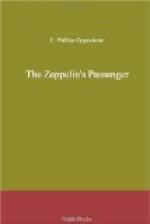“Bertram,” she pleaded, “think of it all. Even if I cared enough— and I don’t—there is something unnatural about it. Doesn’t it strike you as horrible? My brother, my cousins, my father, are all fighting the men of the nation whose cause you have espoused! There is a horrible, eternal cloud of hatred which it will take generations to get rid of, if ever it disappears. How can we two speak of love! What part of the world could we creep into where people would not shrink away from us? I may have lost a little of my heart to you, Bertram, I may miss you when you go away, I may waste weary hours thinking, but that is all. Oh, you know that it must be all!”
“I do not,” he answered stubbornly.
“Oh, you must be reasonable,” she begged, with a little break in her voice. “You know very well that I ought not to listen to you. I ought not to welcome you here. I ought to be strong and close my ears.”
“But you will not do that!”
“No!” she faltered. “Please don’t come any nearer. I—”
She broke off suddenly. The struggle in her face was ended, her expression transformed. Her finger was held up as though to bid him listen. With her other hand she clutched the back of the couch. Her eyes were fixed upon the door. The little patch of wonderful colour faded from her cheeks.
“Listen!” she cried, with a note of terror in her voice. “That was the front door! Some one has come! Can’t you hear them?”
Lessingham’s hand stole suddenly to his pocket. She caught the glitter of something half withdrawn, and shrank back with a half-stifled moan.
“Not before you, dear,” he promised. “Please do not be afraid. If this is the end, leave me alone with Griffiths. I shall not hurt him. I shall not forget. And if by any chance,” he added, “this is to be our farewell, Philippa, you will remember that I love you as the flowers of the world love their sun. Courage!”
The door facing them was opened.
“Captain Griffiths,” Mills announced.
Through the open door they caught a vision of two other soldiers and Inspector Fisher. Griffiths came into the room alone, however, and waited until the door was closed before he spoke. He carried himself as awkwardly as ever, but his long, lean face seemed to have taken to itself a new expression. He had the air of a man indulging in some strange pleasure.
“Lady Cranston,” he said, “I am very sorry to intrude, but my visit here is official.”
“What is it?” she asked hoarsely.
“I have received confirmatory evidence in the matter of which I spoke to you this afternoon,” he went on. “I am sorry to disturb you at such an hour, but it is my duty to arrest this man on a charge of espionage.”
Lessingham to all appearance remained unmoved.
“A most objectionable word,” he remarked.
“A most villainous profession,” Captain Griffiths retorted. “Thank heaven that in this country we are learning the art of dealing with its disciples.”




